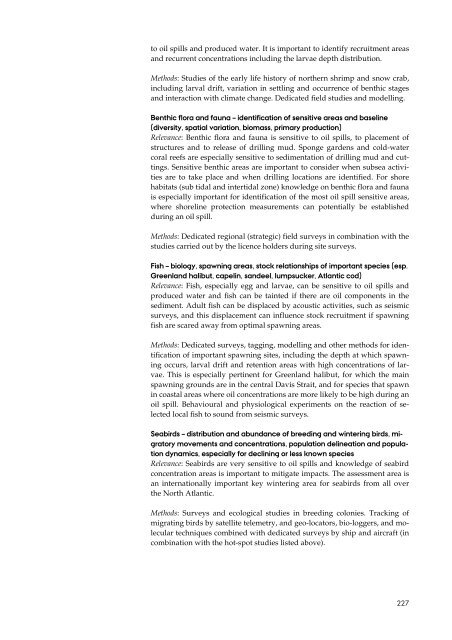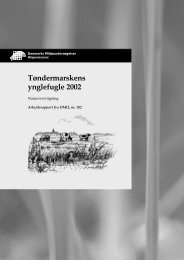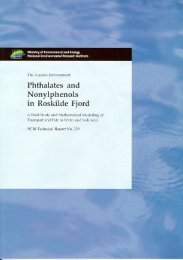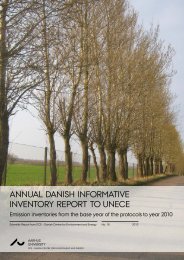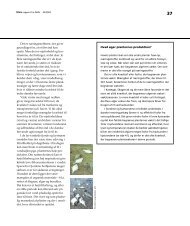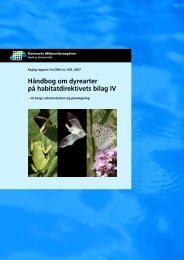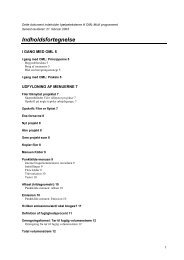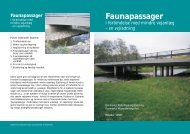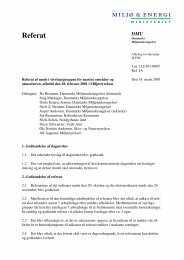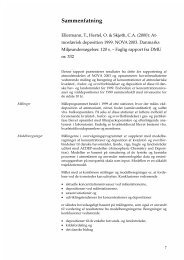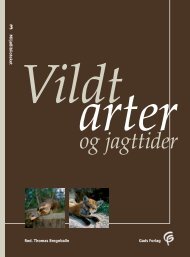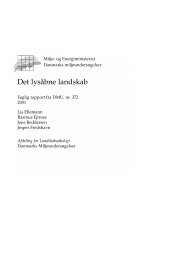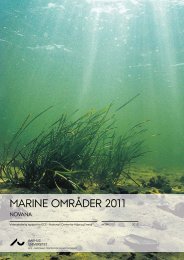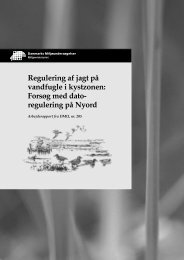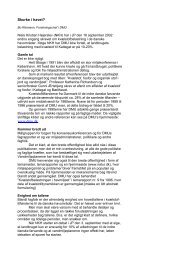The Davis Strait - DCE - Nationalt Center for Miljø og Energi
The Davis Strait - DCE - Nationalt Center for Miljø og Energi
The Davis Strait - DCE - Nationalt Center for Miljø og Energi
Create successful ePaper yourself
Turn your PDF publications into a flip-book with our unique Google optimized e-Paper software.
to oil spills and produced water. It is important to identify recruitment areas<br />
and recurrent concentrations including the larvae depth distribution.<br />
Methods: Studies of the early life history of northern shrimp and snow crab,<br />
including larval drift, variation in settling and occurrence of benthic stages<br />
and interaction with climate change. Dedicated field studies and modelling.<br />
Benthic flora and fauna – identification of sensitive areas and baseline<br />
(diversity, spatial variation, biomass, primary production)<br />
Relevance: Benthic flora and fauna is sensitive to oil spills, to placement of<br />
structures and to release of drilling mud. Sponge gardens and cold-water<br />
coral reefs are especially sensitive to sedimentation of drilling mud and cuttings.<br />
Sensitive benthic areas are important to consider when subsea activities<br />
are to take place and when drilling locations are identified. For shore<br />
habitats (sub tidal and intertidal zone) knowledge on benthic flora and fauna<br />
is especially important <strong>for</strong> identification of the most oil spill sensitive areas,<br />
where shoreline protection measurements can potentially be established<br />
during an oil spill.<br />
Methods: Dedicated regional (strategic) field surveys in combination with the<br />
studies carried out by the licence holders during site surveys.<br />
Fish – biol<strong>og</strong>y, spawning areas, stock relationships of important species (esp.<br />
Greenland halibut, capelin, sandeel, lumpsucker, Atlantic cod)<br />
Relevance: Fish, especially egg and larvae, can be sensitive to oil spills and<br />
produced water and fish can be tainted if there are oil components in the<br />
sediment. Adult fish can be displaced by acoustic activities, such as seismic<br />
surveys, and this displacement can influence stock recruitment if spawning<br />
fish are scared away from optimal spawning areas.<br />
Methods: Dedicated surveys, tagging, modelling and other methods <strong>for</strong> identification<br />
of important spawning sites, including the depth at which spawning<br />
occurs, larval drift and retention areas with high concentrations of larvae.<br />
This is especially pertinent <strong>for</strong> Greenland halibut, <strong>for</strong> which the main<br />
spawning grounds are in the central <strong>Davis</strong> <strong>Strait</strong>, and <strong>for</strong> species that spawn<br />
in coastal areas where oil concentrations are more likely to be high during an<br />
oil spill. Behavioural and physiol<strong>og</strong>ical experiments on the reaction of selected<br />
local fish to sound from seismic surveys.<br />
Seabirds – distribution and abundance of breeding and wintering birds, migratory<br />
movements and concentrations, population delineation and population<br />
dynamics, especially <strong>for</strong> declining or less known species<br />
Relevance: Seabirds are very sensitive to oil spills and knowledge of seabird<br />
concentration areas is important to mitigate impacts. <strong>The</strong> assessment area is<br />
an internationally important key wintering area <strong>for</strong> seabirds from all over<br />
the North Atlantic.<br />
Methods: Surveys and ecol<strong>og</strong>ical studies in breeding colonies. Tracking of<br />
migrating birds by satellite telemetry, and geo-locators, bio-l<strong>og</strong>gers, and molecular<br />
techniques combined with dedicated surveys by ship and aircraft (in<br />
combination with the hot-spot studies listed above).<br />
227


